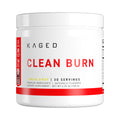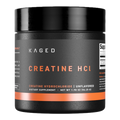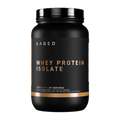Ashwagandha (Withania somnifera) is an ancient Ayurvedic herb often called an “adaptogen,” meaning it helps the body handle stress.
Unlike synthetic steroids or hormone therapy, it doesn’t boost your testosterone directly. Researchers have found that regular intake of ashwagandha root extract can support healthy testosterone levels, performance, and muscle gains.*
Ashwagandha is well-known for managing the stress hormone cortisol, which can indirectly help normalize the body’s hormone balance (high cortisol often suppresses testosterone).
Its stress-relieving effects are so reliable that research reviews note ashwagandha “may lower stress, anxiety, and cortisol levels.”
By easing stress and fatigue, ashwagandha sets the stage for better hormone production and recovery.
Does Ashwagandha Boost Testosterone?
The short answer is: modestly, yes, although the research is clear that the effect is stronger when combined with a solid training program.
Multiple human trials have reported small but significant increases in serum testosterone in otherwise healthy men taking ashwagandha.
For example, a comprehensive 2025 review concluded that “Ashwagandha supplementation can increase testosterone levels in adults with no chronic disorders.”
In plain terms, people who were already in the normal testosterone range often saw a further uptick when supplementing with ashwagandha extract.
Resistance-Trained Men Show The Strongest Benefits
Studies with resistance-trained men show the clearest benefits. One randomized controlled trial put healthy young men on 600 mg/day of KSM-66® Ashwagandha, a high-quality, patented form. For 8 weeks, they weight-trained three days a week. After 8 weeks, the ashwagandha group saw much bigger gains than the placebo group:
-
Strength: Bench press 1RM increased by ~46 kg on average with ashwagandha vs 26 kg in placebo. Leg extension strength rose 14.5 kg vs 9.8 kg. In other words, the ashwagandha users lifted significantly heavier.*
-
Body Composition: Body fat percentage dropped 3.5% in the ashwagandha group compared to 1.5% in the placebo. (They also built a bit more muscle size in arms and chest.)*
-
Testosterone: Total serum testosterone climbed by about +96 ng/dL on average in the ashwagandha group, versus only +18 ng/dL in the placebo group. This was a statistically significant difference (p=0.004). While both groups stayed within the healthy range, the ashwagandha group’s increase was notably larger.*
All participants did the same weightlifting routine, so the researchers could link the results to the KSM-66® Ashwagandha.
This suggests ashwagandha may amplify the effects of training:
In practical terms, adding ashwagandha meant these men gained more strength and lost more fat than they would have on training alone.
Improvements in Men With Lower T or Other Markers
While not as relevant to healthy men looking to improve testosterone, ashwagandha has also been shown to be effective in different populations.
For instance, a trial on infertile men (who started with low sperm counts and hormone levels) took 675 mg/day of an ashwagandha extract for 90 days.
Their sperm count tripled and their serum testosterone rose about 17%(from 4.45 to 5.22 ng/mL on average, p<0.01). Luteinizing hormone (LH, which stimulates testosterone production) rose ~34%.
This suggests that ashwagandha not only helped sperm parameters but also nudged up hormone levels in men with suboptimal T. Even though this was a special population, it reinforces that ashwagandha can modestly elevate testosterone and related hormones in human men.
Men with Low Sex Drive
A third example: an 8-week trial in men with low sex drive gave 300 mg twice daily (600 mg total) of ashwagandha root extract. Compared to the placebo, the supplemented group showed a statistically significant rise in serum testosterone. Reviews of multiple such trials (including this one) confirm that Ashwagandha often improves hormone profiles.
How Ashwagandha Influences Testosterone: The Mechanisms
What might be happening in the body? Scientists propose a few mechanisms:
-
Stress reduction: By lowering cortisol and perceived stress, ashwagandha removes a known inhibitor of testosterone. Chronic stress can suppress the hypothalamic-pituitary-gonadal (HPG) axis, so easing stress allows normal testosterone signaling to rebound.
-
Hormonal signaling: Some studies observed rises in LH (the pituitary signal for testosterone) along with higher T, suggesting ashwagandha may gently stimulate the brain-gonad axis. The active compounds (withanolides) are chemically similar to human sex hormones, although they don’t act as hormones per se.
-
Antioxidant and recovery effects: Ashwagandha’s antioxidant and anti-inflammatory properties may protect testicular cells and support sperm development. Lower oxidative stress in tissues can contribute to healthier hormone production.
Ashwagandha's Testosterone Improvements Are Modest
Even in studies, testosterone increases are modest (on the order of 10–20% or so) and stay within the normal range.
In the weight-training study, the post-intervention average testosterone for the Ashwagandha group was still around 726 ng/dL vs 693 ng/dL for placebo.
What this means in real life is that ashwagandha can subtly boost your body’s own testosterone if it’s borderline low or if you’re recovering from stress, but it won’t pump levels into abnormal ranges.
However, if you’re like us at Kaged, then you care about those subtle improvements.
The Right Ashwagandha Dosage, Forms, and Protocol for Testosterone
Dosage and Forms
Most positive studies used 300–600 mg per day of a concentrated ashwagandha root extract, usually split into two doses.
Our Kaged Test and Test Elite formulations use 600 mg of KSM-66® Ashwagandha. This is a full-spectrum, root-only extract standardized to >5% withanolides (water-extracted).
This is the form shown to be successful in studies on healthy, resistance-trained men. That’s who we formulated our products for, so that’s the form we use.
Protocol
Typically, studies looked at people taking ashwagandha daily for 6-12 weeks. Some studies on stress go 12 weeks or longer. Take ashwagandha daily. We examined whether it’s best to take it in the morning or evening. An easy way to get the best of both, and easy any common stomach tolerance challenges, is to split it into two, 300mg doses. That’s why Kaged Test and Test Elite have a 2-capsule serving.
Safety
Ashwagandha is generally well-tolerated. In all the studies above, subjects reported no serious side effects. Minor side effects can include an upset stomach. Which is another reason to split up the dose.
Long-term safety (beyond a few months) is still being studied, but it has a long history of traditional use.
One note: because it can increase thyroid hormones and testosterone, people on thyroid medication or with hormone-sensitive conditions should use caution. As with any supplement, it’s wise to discuss it with a healthcare provider if you have existing conditions or are on medications.

TRY KAGED TEST
*These statements have not been evaluated by the FDA. This product is not intended to diagnose, treat, cure, or prevent any disease.

































